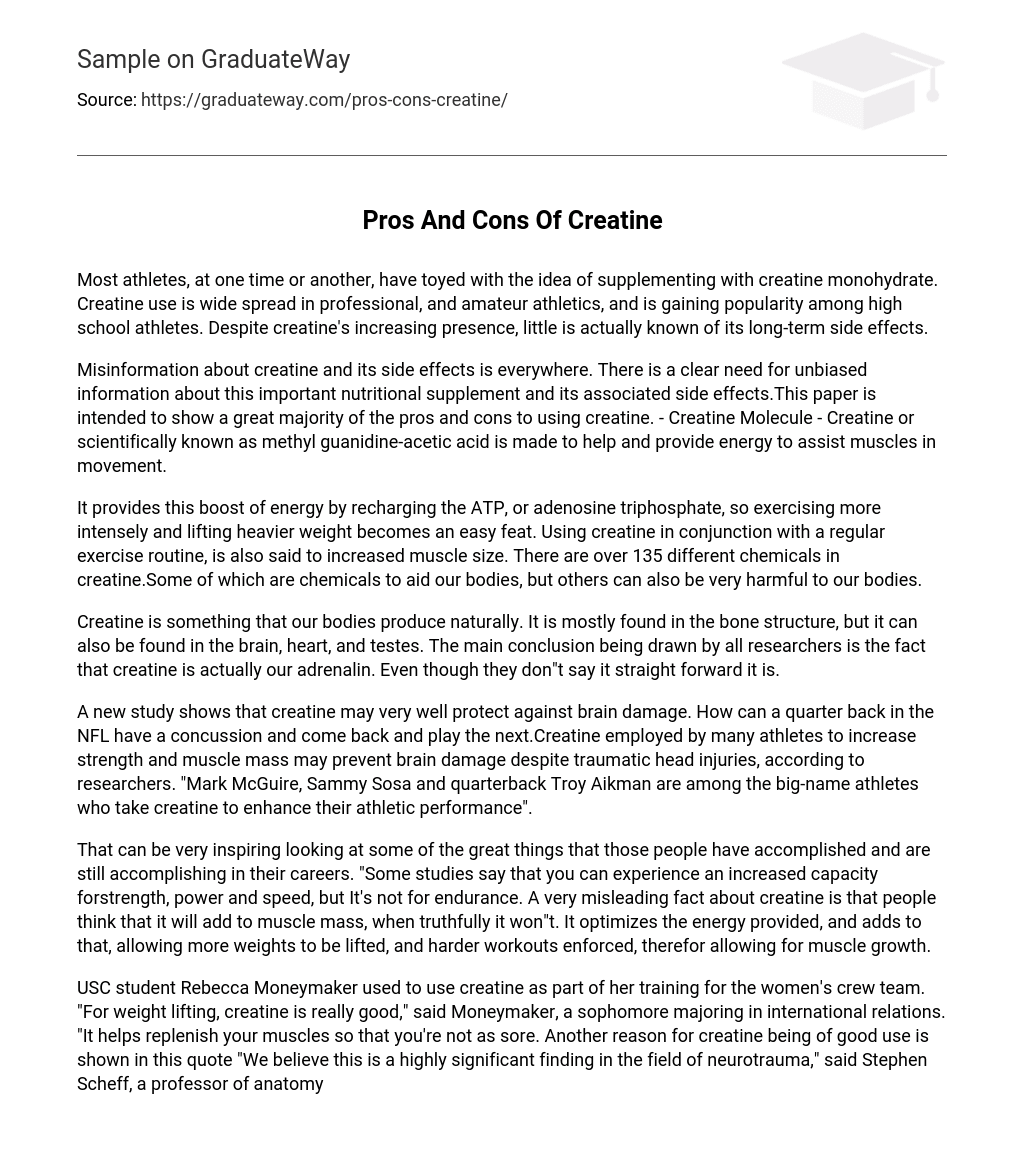Both professionals and amateurs, including high school athletes, have contemplated incorporating creatine monohydrate as a supplement. Yet, there remains insufficient understanding of the potential long-term adverse effects of this substance.
The abundance of misinformation surrounding creatine and its potential side effects needs to be addressed. It is crucial to disseminate unbiased information about this vital dietary supplement and its associated drawbacks. This study aims to thoroughly examine the benefits and downsides of using creatine. – Creatine Molecule – Creatine, also known as methyl guanidine-acetic acid, helps supply energy for muscular movement.
Creatine is well-known for its ability to replenish adenosine triphosphate (ATP), providing a boost of energy that makes it easier to engage in intense exercise and lift heavier weights. It is believed that incorporating creatine into a regular workout routine can enhance muscle size. However, it should be noted that creatine consists of more than 135 different chemicals, some of which have beneficial effects on our bodies while others may be harmful.
Creatine is a naturally occurring compound that is present in our bodies, primarily in the bones but also in the brain, heart, and testes. It is widely believed among experts to function as our body’s adrenalin, even though this may not be explicitly stated.
Recent research suggests that the use of creatine by NFL quarterbacks after concussions could have a neuroprotective effect. This raises intriguing inquiries into how they are able to return to playing so quickly. Studies indicate that athletes who incorporate creatine supplements into their routines to improve strength and muscle mass may also help reduce brain damage following traumatic head injuries. It is worth mentioning that well-known athletes like Mark McGuire, Sammy Sosa, and quarterback Troy Aikman include creatine as part of their training programs in order to enhance athletic performance.
Observing the impressive accomplishments and continued prosperity of individuals in their specific professions can be incredibly inspiring. Studies indicate that incorporating creatine into one’s routine can boost strength, power, and speed; however, it does not enhance endurance. A widespread misunderstanding surrounding creatine is its direct correlation to muscle mass gain, when in reality its primary function involves optimizing energy provision and enabling higher lifting capacity during intense exercise sessions. As a result, this helps foster muscle development.
Rebecca Moneymaker, a sophomore at USC majoring in international relations, previously incorporated creatine into her training regimen for the women’s crew team. Moneymaker stated that creatine offers benefits for weightlifting by assisting with muscle recovery and reducing soreness. Additionally, Stephen Scheff, an anatomy and neurobiology professor at the University of Kentucky’s College of Medicine, considered this finding to be highly significant in the field of neurotrauma.
Research published in the Annals of Neurology suggests that creatine, a naturally occurring amino acid found in the liver, kidney, and pancreas, may help with brain recovery after concussions and other common sports injuries. The study concluded that there is no other treatment or substance that offers a similar level of benefit in preventing significant brain trauma. In North America, over 7 million people suffer from brain injuries each year, with more than 300,000 of these occurring during sports or recreational activities according to the Centers for Disease Control and Prevention.According to research conducted by Scheff’s team, the administration of creatine to mice three days before injury resulted in a 21% reduction in brain damage. If given five days beforehand, the decrease in brain damage was even greater at 36%. Additionally, rats that consumed a diet supplemented with creatine for up to four weeks prior to injury experienced a significant 50% reduction in brain damage compared to those on a regular diet. Overall, creatine offers multiple benefits including increased energy levels, potential disease management, and improved bodily function. However, it is important to consider the potential side effects associated with this product.
Although some side effects of creatine have been scientifically proven, others remain unconfirmed. Many of these side effects are associated with its capacity to retain water in specific areas of the body, like skeletal muscle or the intestine. This retention of water often results in a noticeable weight gain as water shifts from the blood into skeletal muscle.
Volumizing, also known as muscle growth, leads to an increase in muscle volume. Although this is beneficial for bodybuilding, it may not be suitable for endurance sports or long-distance running. Consuming creatine has been linked to gastrointestinal issues like nausea and diarrhea, especially when taken in excessive quantities. These side effects are likely caused by undissolved creatine attracting water and causing retention in the intestine.
Consuming smaller doses of creatine greatly decreases the chance of encountering negative effects. Nevertheless, there is apprehension regarding the consumption of larger quantities, particularly during the loading phase, as it may potentially harm the liver and kidneys. This occurs because the kidneys must exert more effort to eliminate surplus unabsorbed creatine from the bloodstream.
Another benefit of the drug is cramps, which are a common effect seen in skilled athletes who use creatine. However, it’s important to note that muscle tightness caused by creatine intake can potentially lead to serious injuries such as strained muscles or even tears.





